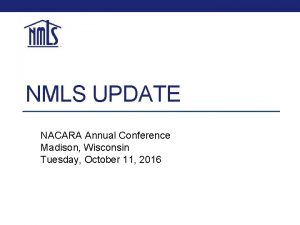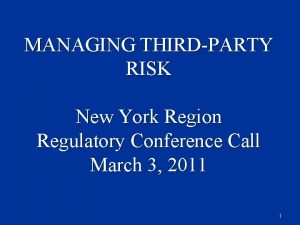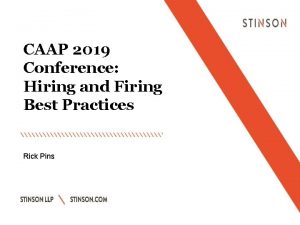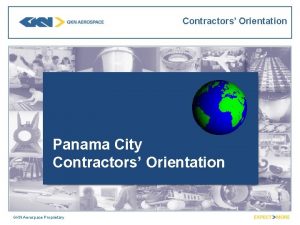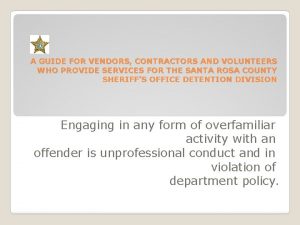CAAP 2019 CONFERENCE Independent Contractors and Volunteers and



























- Slides: 27

CAAP 2019 CONFERENCE Independent Contractors and Volunteers and Unpaid Interns and Other Wage and Hour Considerations Rick Pins October 2019

IT’S ALL ABOUT WAGES– MEANING ITS ALL ABOUT THE FLSA • FLSA generally covers employees and employers engaged in interstate commerce • FLSA includes pre-schools, nursing homes, and schools • Also covers government employers • Does not cover independent contractors, trainees/interns or volunteers • Where does state law apply? And to whom? 2

Independent Contractors • Degree of control over the manner in which work is performed • Opportunity for profit or loss • Investment in equipment, material, labor • Degree of skill and independent initiative required to perform work • Permanence or duration of working relationship • Whether service rendered is an integral part of putative employer’s business 3

Independent Contractors – Common Mistakes • Relying on consultant label or contract recitals as dispositive • Relying on incorporation of independent business – helpful but not determinative • Integrated workforce (e. g. , employers and “consultants” work side by side performing similar tasks) • Integrated compensation systems (e. g. , “consultants” eligible for commissions or bonuses pursuant to compensation plans applicable to employees) • Long-term or exclusive relationship • Re-designing employees as dependent contractors as a cost-saving measure • Retaining former employees as “consultants” 4

Interns DOL Uses a Six-Factor Test 1. The internship, even though it includes actual operation of the facilities of the employer, is similar to training which would be given in an educational environment; 2. The internship experience is for the benefit of the intern; 3. The intern does not displace regular employees, but works under close supervision of existing staff; 4. The employer that provides the training derives no immediate advantage from the activities of the intern, and on occasion its operations may actually be impeded; 5. The intern is not necessarily entitled to a job at the conclusion of the internship; and 6. The employer and intern understand that the intern is not entitled to wages for the time spent in the internship. 5

Interns Practical Guidance • Collaborate with educational institutions. • Assign as the intern’s supervisor an individual with knowledge about the substantive area that the intern is to be learning. • Ensure that supervisors overseeing the intern understand that the intern is not to perform work that other employees would normally perform. • Ensure that supervisors and other employees do not assign interns administrative tasks like photocopying and coffee runs that are not related to an educational benefit. • Offer experiences to the intern that are specifically for the intern’s benefit. • Require the interns to acknowledge in writing that they understand the program is an internship, that they are not employees, that the program is for their educational benefit, and that they will not be paid. • Set specific dates for the beginning and end of the internship program. • Ensure that the program trains the intern regarding the business or industry generally. 6

Minimum Wage • Covered, non-exempt employees must be paid not less than the federal minimum wage for all hours worked • The minimum wage is $7. 25 per hour • Must also pay overtime for all hours worked in excess of 40 per workweek • DON’T FORGET STATE AND LOCAL LAWS 7

Determining Compensation • To determine if an employee has been paid the minimum wage for all hours worked in each week, add all compensation received and divide amount by all hours worked for the week • Payments counted towards minimum wage: • Wages (salary, hourly, piece rate); • Commissions; • Some bonuses; • Tips received by eligible employees (check state law); and • Reasonable cost of room, board, and other “facilities” provided by employer for employee’s benefit 8

Hours Worked - Considerations • Because the employer cannot determine the amount of money to pay an employee without knowing the number of hours worked, issues often arise regarding: • Suffered or Permitted • Waiting Time • On-Call Time • Meal and Rest Periods • Training Time • Travel Time • Sleep Time 9

Hours Worked – Suffered or Permitted • If employer doesn’t want to pay overtime, it must ensure that work is not performed • Simply telling employees that it is against the rules to work overtime is not good enough • Management has the power to enforce the rules and must make every effort to do so through discipline of employees and supervisors • If the employer knows or has reason to believe that the work is being performed, the employer must count the time as hours worked. • See 29 CFR 785. 12, 785. 13 10

Waiting Time • Counted as hours worked when • Employee is unable to use the time effectively for his or her own purposes; and • Time is controlled by the employer • Not counted as hours worked when • Employee is completely relieved from duty; and • Time is long enough to enable the employee to use it effectively for his or her own purposes • See 29 CFR 785. 15, 785. 16 11

On Call Time • On-call time is hours worked when • Employee has to stay on the employer’s premises • Employee has to stay so close to the employer’s premises that the employee cannot use that time effectively for his or her own purposes • On-call time is not hours worked just because: • Employee is required to carry a pager • Employee is required to leave word at home or with the employer where he or she can be reached • See 29 CFR 785. 17 12

Meal and Rest Breaks • Meal periods are not hours worked when the employee is relieved of duties for the purpose of eating a meal • Rest periods of short duration (normally 5 to 20 minutes) are counted as hours worked and must be paid • See 29 CFR 785. 18, 785. 19 13

Training Time • Time employees spend in meetings, lectures, or training is considered hours worked and must be paid, unless • Attendance is outside regular working hours; • Attendance is voluntary; • The course, lecture, or meeting is not job related; and • Employee does not perform any productive work during attendance • See 29 CFR 785. 28, 785. 29, 785. 30 14

Training Time • In-service training offered only after regular working hours • Employer did not require attendance at the training; it was the employee’s decision to participate • Employer did not impose additional requirements on employee such as taking a particular course • Met exception from the requirement that training not be directly related to employee’s job because (1) training is for benefit of employee and (2) corresponded to courses offered by independent bona fide institutions of learning • Employee not performing any productive work during training 15

Travel Time • Ordinary commuting travel is not hours worked • Travel between job sites during the normal work day is hours worked • Special rules apply to travel away from the employee’s home community • For example, passive travel outside regular work hours not hours worked • See 29 CFR 785. 37, 785. 38, 785. 39 16

Overtime • Covered, non-exempt employees must receive one and one-half times the regular rate of pay for all hours worked over 40 in a workweek • Each workweek stands alone • Holiday Hours? • Vacation Hours? • Other Leave? • Regular rate • Payments excluded from rate • Payments other than hourly rates • Deductions 17

Comp Time • Rule: there is no such thing for non-exempt employees in the private sector! [NOT YET AT LEAST! STAY TUNED. ] • Covers non-exempt employees working for private-sector (nongovernmental) employers • Each workweek stands alone; cannot average multiple workweeks • May use for exempt employees 18

Volunteers • Staff volunteers are only a problem for employers if the volunteers are nonexempt employees • Non-exempt employees must be paid for every “hour worked” and paid time and a half for hours worked over 40 in one week 19 14404116. 1 19

What is NOT Volunteering • Time spent by non-exempt employees in work for public or charitable purposes: • At the employer’s request; OR • Under the employer’s direction or control; OR • While the employee is required to be on premises • Is working time (not volunteer activity) • And must be paid as such • 29 CFR 785. 44 20

Volunteering • But, time spent voluntarily in such activities (no coercion – truly voluntary) • Outside of the non-exempt employee’s normal working hours • And where volunteer activities are not the same or similar to compensated duties • Is volunteer activity and not hours worked 21

Hypothetical • Action in the Community, Inc. runs Earned Income Tax Credit weekend and evening clinics, using volunteers, including non-employee lawyers and accountants. The program coordinator also solicits employee volunteers. Here’s who is interested: • Finance Department employee, whose job includes completing the Form 990 and other financial info for ATI, would like to volunteer; • Head Start teacher; and • Intake worker whose job is to collect information from clients to determine eligibility for various ACI programs • May these employees volunteer? • If you determine that they may not, can the employee sign a waiver of right to compensation? • If you must pay them, must you pay them their ordinary wage or salary? 22

Hypothetical • Tip of the CAP treats Derek as an independent contractor. It does not offer Derek benefits or deduct payroll taxes from his weekly checks. He does receive weekly paychecks, but they are processed by the accounting department, not by the payroll provider. Derek is paid on a 1099 basis. While it is true that Derek works mostly for CAP, he does perform some general handyman work for various other companies and individuals on nights and weekends, for which he uses his own tools and with which CAP takes no issue. Last year, CAP paid Derek for the equivalent of 1963 hours worked, but it has no fixed expectation for this year. It is most often the case that Derek doesn’t know his schedule at CAP until two weeks in advance, at which point Derek provides him upcoming assignments. Most often those assignments require him to work upwards of 40 -45 hours per week, but there have been times that Derek has been asked to work less than 15 or more than 60 hours in a week. Derek’s office is his truck, which he owns, but he is reimbursed for mileage. Is CAP required to pay Derek an overtime premium when he works 53 hours in a week? 23

Hypothetical Maria just graduated from Rutgers. She got a degree in communications, and is struggling to find a job. Along comes Community Awareness with an offer for Maria. She can intern in its public relations department. It will give her great public relations experience. She will get to work closely with Arnold, who heads the PR department. She will draft press releases for CA, and will also go with Arnold to pressers. CA’s PR department is incredibly busy. In fact, it just lost one of its best writers. Thus, Maria will be expected to work 40 hours a week. She will not be required to do any gophering. CA has made it clear that this is an internship, not a permanent job, but has hinted she may have a future with CA if all goes well. Does CA need to pay Maria? If so, can it 1099 her? 24

Hypothetical Jimmy Mc. Gill is a college student, who has returned for each of the past three summers to help out at the local CAP. He works only during the summer, after which he disappears again until the following summer. Jimmy has a second job, so he is scheduled to work only 28 hours a week. He does get holiday pay, even if its not his work day, and he also gets 5 PTO days. If Jimmy works for more than 28 hours during a summer work week, does CAP have to pay him overtime for that week? What if during one brutal week he works 52 hours, but the following week he’s back to his ordinary 28. He’s paid bi-weekly, so he actually only worked 80 hours over that period. OT? What if he works 9 hours each day from Monday through Thursday and Friday is a holiday, for which he receives 8 hours pay? 25

Hypothetical Carrie and Quinn are daycare assistants. Their shifts run from 7: 00 to 3: 00 five days a week. They are expected to be in the room with the kids at 7: 00 a. m. , and cannot leave a minute before 3: 00 p. m. They are disciplined for tardies and for leaving early. In fact, there is a strict no-fault attendance policy which allows no more than 5 points, with each unexcused absence, tardy and early departure counting as a full point. To avoid accruing points, the pair regularly does two things: (1) they try to both show up early, and often punch in at 6: 45 a. m. ; and (2) when they both can’t be there, they cover for one another, and punch the other in. Likewise, to ensure that they are not pointed-out on the back end, they always punch at no sooner than 3: 04 p. m. , and again, when necessary they punch out for one another. • Can you round up to 7: 00 a. m. and down to 3: 00 p. m. each day? • They shouldn’t be punching in and out for one another, right? Can we dock the extra time to account for that behavior? How about just round to account for it? 26

Thank You Richard W. Pins 612. 335. 7007 DISCLAIMER: This presentation is designed to give general information only. It is not intended to be a comprehensive summary of the law or to treat exhaustively the subjects covered. This information does not constitute legal advice or opinion. Legal advice or opinions are provided by Stinson LLP only upon engagement with respect to specific factual situations. © 2019 STINSON LLP STINSON. COM
 4 caap
4 caap Caap articulation test
Caap articulation test Survey questions for volunteers
Survey questions for volunteers Bharat nirman volunteers
Bharat nirman volunteers Literacy volunteers
Literacy volunteers National community service
National community service Working together rafael and salvador
Working together rafael and salvador Dogs trust basildon
Dogs trust basildon Vanderbilt student volunteers for science
Vanderbilt student volunteers for science Afghan peace volunteers
Afghan peace volunteers Vanderbilt student volunteers for science
Vanderbilt student volunteers for science Dealing with troublesome volunteers
Dealing with troublesome volunteers Ba conference 2019
Ba conference 2019 Iala conference 2019
Iala conference 2019 Sasfaa conference
Sasfaa conference Esop conference 2019 las vegas
Esop conference 2019 las vegas Nmls resource center
Nmls resource center Third party risk management conference 2019 new york
Third party risk management conference 2019 new york Executive assistant conference 2019
Executive assistant conference 2019 2019 dod allied nations technical corrosion conference
2019 dod allied nations technical corrosion conference Ppl members
Ppl members Mil-std-889d
Mil-std-889d Png investment conference 2019
Png investment conference 2019 Wind energy science conference
Wind energy science conference Cdha perks
Cdha perks Appa eo conference 2019
Appa eo conference 2019 Kca deutag investor relations
Kca deutag investor relations The microcap conference 2019
The microcap conference 2019
















